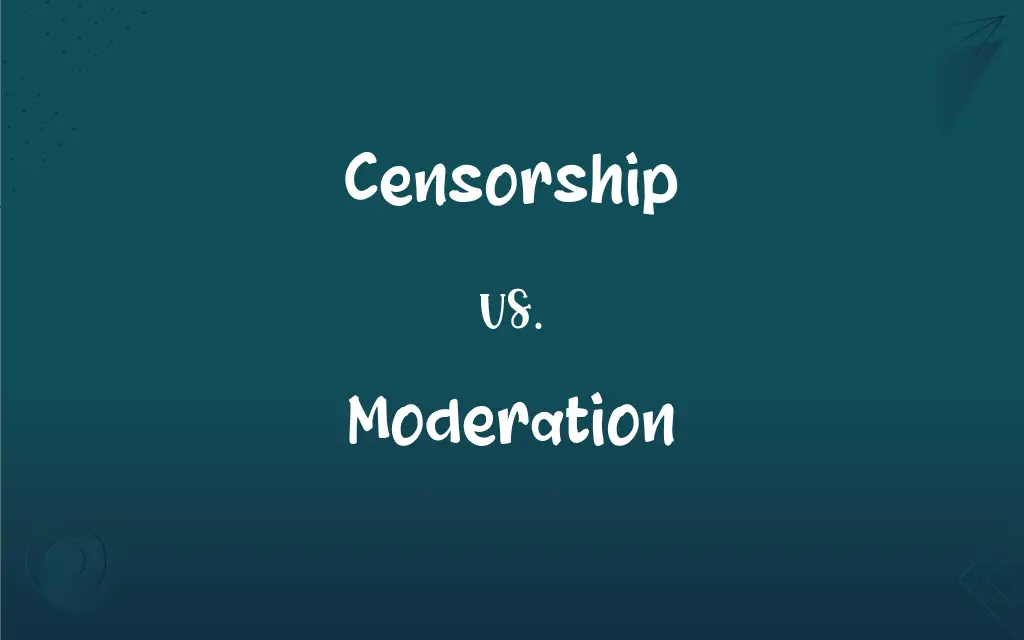Censorship vs. Moderation: What's the Difference?
Edited by Aimie Carlson || By Janet White || Published on November 3, 2023
Censorship is the suppression or prohibition of content deemed harmful or objectionable, while moderation is the reviewing and managing of content based on set guidelines.

Key Differences
Censorship often comes from a place of authority, be it a government, organization, or institution, with the intent to control or suppress certain types of information. This suppression could be due to political reasons, moral stances, or other factors seen as threats. On the other hand, moderation is a more nuanced approach, generally employed by platforms or communities to ensure the content aligns with their specific guidelines or standards.
At its core, censorship seeks to limit or eradicate access to specific content entirely, often based on broader societal or governmental standards. For instance, a government might employ censorship to prevent anti-government sentiment. Conversely, moderation focuses on curating content to fit within a defined framework. An online forum, for example, might employ moderation to filter out hate speech or spam.
While censorship is more absolute and can be seen as a top-down approach, moderation is usually more collaborative. Moderation relies on community guidelines, and often the community itself can participate, flagging content or reporting violations. Although censorship has its roots in controlling information flow, moderation aims to create a safer or more relevant environment for its audience.
Censorship can be seen as an external force that dictates what is allowable, often without input from those directly affected. In some cases, censorship can be viewed as infringing on rights, especially when it relates to freedom of expression. Meanwhile, moderation, especially when transparent and consistent, is generally seen as a tool to maintain decorum and respect within a community or platform.
Censorship might lack flexibility, adhering strictly to dictated norms. Moderation, in contrast, can evolve based on community feedback, changes in societal standards, or shifts in platform goals.
ADVERTISEMENT
Comparison Chart
Definition
Suppression of content.
Reviewing and managing content.
Origin
Authority-driven.
Platform or community-driven.
Flexibility
Often rigid.
Can be adaptable based on guidelines.
Goal
Control or suppress information.
Ensure content alignment with guidelines.
Community Involvement
Typically limited.
Often allows for community feedback or participation.
ADVERTISEMENT
Censorship and Moderation Definitions
Censorship
The act of prohibiting or suppressing content.
The government's strict censorship laws prevent certain books from being published.
Moderation
Managing content based on set guidelines.
The forum relies on moderation to prevent hate speech.
Censorship
Restriction on freedom of expression.
Artists often protest against censorship of their work.
Moderation
The process of reviewing and adjusting content.
Without proper moderation, online platforms can become chaotic.
Censorship
Officially examining and suppressing unacceptable parts.
Under the regime's censorship, many films were banned.
Moderation
Ensuring balance and appropriateness.
Comments undergo moderation before appearing on the website.
Censorship
Control over the information and ideas circulated.
Internet censorship is prevalent in some countries.
Moderation
Being within reasonable limits; not excessive or extreme
A moderate price.
Censorship
The act, process, or practice of censoring.
Moderation
Not violent or subject to extremes; mild or calm; temperate
A moderate climate.
Censorship
The office or authority of a Roman censor.
Moderation
Of medium or average quantity or extent.
Censorship
In psychoanalytic theory, prevention of disturbing or painful thoughts or feelings from reaching consciousness except in a disguised form.
Moderation
Of limited or average quality; mediocre.
Censorship
The use of state or group power to control freedom of expression or press, such as passing laws to prevent media from being published or propagated.
Moderation
Opposed to radical or extreme views or measures, especially in politics or religion.
Censorship
(historical) The role of the censor magistrate in Ancient Rome.
Moderation
One who holds or champions moderate views or opinions, especially in politics or religion.
Censorship
The office or power of a censor; as, to stand for a censorship.
The press was not indeed at that moment under a general censorship.
Moderation
To cause to be less extreme, intense, or violent.
Censorship
Counterintelligence achieved by banning or deleting any information of value to the enemy
Moderation
To preside over
She was chosen to moderate the convention.
Censorship
Deleting parts of publications or correspondence or theatrical performances
Moderation
To become less extreme, intense, or violent; abate.
Censorship
Removal of content deemed offensive or harmful.
The radio station faced censorship after airing controversial statements.
Moderation
To act as a moderator.
Moderation
The state or quality of being moderate; avoidance of extremes
Moderation
An instance of moderating: bringing something away from extremes, especially in a beneficial way
Moderation
The process of moderating a discussion
The moderation of a large online forum can be hard work.
Moderation
The act of moderating, or of imposing due restraint.
Moderation
The state or quality of being mmoderate.
In moderation placing all my glory,While Tories call me Whig, and Whigs a Tory.
Moderation
Calmness of mind; equanimity; as, to bear adversity with moderation.
The calm and judicious moderation of Orange.
Moderation
The first public examinations for degrees at the University of Oxford; - usually contracted to mods.
Moderation
Quality of being moderate and avoiding extremes
Moderation
A change for the better
Moderation
The trait of avoiding excesses
Moderation
The action of lessening in severity or intensity;
The object being control or moderation of economic depressions
Moderation
Restraining from excessiveness.
It's essential to drink alcohol in moderation to maintain health.
Moderation
The act of making something less severe or intense.
The teacher used moderation in disciplining the students, ensuring fairness.
FAQs
Are all forms of censorship government-driven?
No, while governments often employ censorship, private entities, institutions, or individuals can also censor.
How transparent is the moderation process?
Moderation transparency varies by platform. Some offer clear guidelines, while others might be more opaque.
Is censorship always negative?
While often criticized, censorship might be used with positive intentions, like preventing hate speech, though it's debated.
Can censorship exist within moderation processes?
Yes, if moderation guidelines strictly suppress certain viewpoints, it can be viewed as a form of censorship.
What's the key benefit of moderation?
Moderation ensures content aligns with guidelines, fostering a safe/respectful environment.
Do censorship and moderation impact creativity?
Both can influence creativity, with censorship possibly limiting it and moderation shaping it within guidelines.
Who decides what's censored?
Censorship decisions often come from authorities, governments, or platform owners.
Who usually handles moderation on online platforms?
Moderation is often overseen by platform administrators, moderators, or even AI tools.
Can moderation prevent online abuse?
Effective moderation can reduce online abuse, though it might not eliminate it entirely.
How do people respond to censorship?
Reactions vary, but many advocate for freedom of expression and oppose excessive censorship.
Does censorship always violate freedom of speech?
Censorship can be seen as infringing on free speech, but context matters, like public safety or preventing hate speech.
Can censorship protect citizens?
Yes, censorship can prevent misinformation or harmful content, though it's debated.
Do users trust automated moderation tools?
Trust varies. While automation can be efficient, concerns about accuracy and fairness exist.
Why do some platforms resist moderation?
Some believe moderation limits free expression or find it resource-intensive.
Is self-censorship common?
Yes, individuals might self-censor due to societal pressures or perceived consequences.
Is moderation subjective?
Moderation can have subjective elements based on guideline interpretation.
What challenges do platforms face with moderation?
Platforms struggle with consistency, bias, resource allocation, and evolving guidelines in moderation.
Can censorship be temporary?
Yes, censorship can be lifted once deemed unnecessary.
How can users influence moderation policies?
Users can provide feedback, ensuring moderation evolves with community needs.
Does censorship exist worldwide?
Censorship practices vary globally, with some places having stringent rules and others being more open.
About Author
Written by
Janet WhiteJanet White has been an esteemed writer and blogger for Difference Wiki. Holding a Master's degree in Science and Medical Journalism from the prestigious Boston University, she has consistently demonstrated her expertise and passion for her field. When she's not immersed in her work, Janet relishes her time exercising, delving into a good book, and cherishing moments with friends and family.
Edited by
Aimie CarlsonAimie Carlson, holding a master's degree in English literature, is a fervent English language enthusiast. She lends her writing talents to Difference Wiki, a prominent website that specializes in comparisons, offering readers insightful analyses that both captivate and inform.






































































